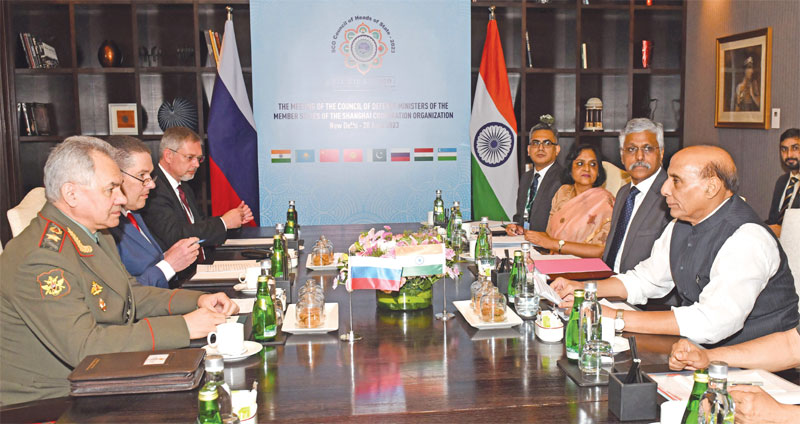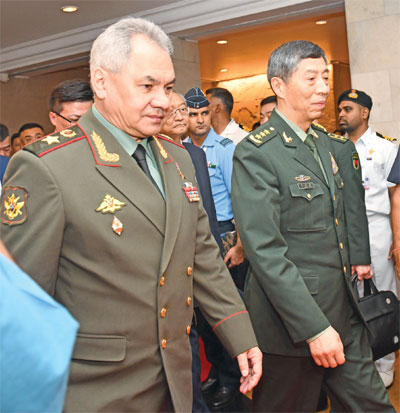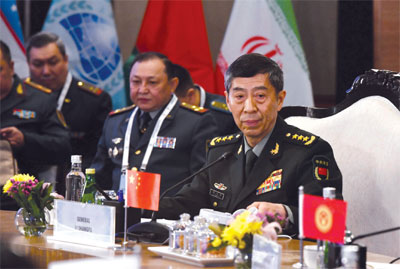The SCO hopes to promote regional peace but is plagued by border differences between member-sates
Smruti Deshpande
The 23rd meeting of defence ministers of the Shanghai Cooperation Organisation, an intergovernmental organisation, was chaired by India in New Delhi. The meeting held on 28 April 2023 was attended by the defence ministers of China, Russia, Iran, Belarus, Kazakhstan, Uzbekistan, Kyrgyzstan and Tajikistan. From Pakistan, the special advisor to the Prime Minister on defence, Malik Ahmed Khan, joined through video conference. Pakistan defence minister Khawaja Asif had been sent an invite for an in-person presence at the meeting. Belarus is an observer state whereas Iran participated as a full member of the SCO for the first time. In the case of China, defence minister Li Shangfu visited India for the first time since June 2020 when Indian and Chinese troops engaged in clashes.

The agenda of this meeting was to discuss matters concerning regional peace and security, counter terrorism efforts within the SCO and an effective multilateralism. The theme of this year’s meeting was ‘Secure SCO’.
The SCO currently comprises nine-member states: China, India, Russia, Pakistan, Tajikistan, Kazakhstan, Kyrgyzstan, Uzbekistan and Iran. As of today, the organisation has three observer states interested in full membership, they are Afghanistan, Belarus and Mongolia. There are six dialogue partners: Armenia, Azerbaijan, Cambodia, Nepal, Sri Lanka and Turkey. India and Pakistan joined the grouping in 2017. The organisation was founded in Shanghai on 15 June 2001.
The institution is based on summit meetings of leaders of the member countries. There are inter-ministerial coordination committees. These countries coordinate on various levels, including the macro-economic level. Furthermore, they coordinate in energy, finance as well as the investment market. The countries also have a Regional Anti-Terrorist Structure (RATS). The Organisation has two permanent bodies—the secretariat in Beijing (China) and the Regional Anti-Terrorist Structure (RATS) in Tashkent. The SCO secretary-general and RATS executive committee director are appointed by the HSC for a period of three years. Russian and Chinese are the official working languages of the SCO.
The SCO also has a Business Council founded in 2006. It is a nongovernment entity that unites the highly authoritative business community representatives of the SCO member-states with an eye towards expanding economic cooperation, establishing direct relations and a dialogue between the business and financial communities and facilitating the practical promotion of multilateral projects.
The SCO Interbank Consortium (SCO IBC), established in 2005, provides funding and bank services for the investment projects sponsored by the governments of the SCO member-states. The SCO IBC Council meets ad hoc upon the consensus of all the parties at least once a year.
Since its inception in 2001, the SCO has mainly focused on regional security issues, its fight against regional terrorism, ethnic separatism and religious extremism. To date, the SCO’s priorities also include regional development. The underlining principle of this association has been that it “does not intend to form any alliances or direct its actions against any sovereign entity.” The Council of National Coordinators of SCO member-states (CNC) is in charge of coordinating interaction within the SCO framework.
While meetings of the SCO are regular, during the Covid-19 pandemic the grouping held several virtual meetings. The summit in Samarkand last year was the first physical meeting post the pandemic.
On the working of the SCO, the dean of the School of International Studies and a professor of China Studies at Jawaharlal Nehru University, Srikanth Kondapalli, says that there are several such groups in the making of the SCO. He adds that the institution is interactive and the members-states are in touch on a regular basis. “They do not have a headquarter except for the one in Beijing called the Secretariat, which means they do have a bureaucracy, unlike other groupings such as the Asean.” The grouping has been “robust in its mechanisms and the summits are the most attractive.”
He says decisions in the grouping are taken through consensus unlike in the Brics, where there is one country, one vote. Russia and China are the dominant powers because they contribute 24 per cent each to the SCO’s budget. The rest of the countries, including India, pay about 10 per cent each. According to Kondapalli, India and Pakistan, who joined only in 2017, have limited influence.
Member States
This organisation brings together different countries in Eurasia. It is a one-of-a-kind grouping that brings several countries who have disputes on one platform. In the case of India, both its neighbours, China and Pakistan, are a part of this grouping. India has age-old border disputes with both these China and Pakistan.

Last year, during the SCO meeting in Samarkand, Chinese President Xi Jinping and Prime Minister Narendra Modi met for the first time since the Galwan border clashes in 2020. While India and China have held 18 Corps Commander level talks for the resolution of the disputed border points, India’s relations with Pakistan have deteriorated since 2019 with a dry spell of bilateral talks. In fact, in January 2023, Pakistan revealed that there had been a complete absence even in backchannel talks with India.
In terms of Central Asian Republics too, most the participants have border disputes with one another. In fact, last year even as the high-level meeting was going on in Samarkand in Uzbekistan, Kyrgyzstan and Tajikistan exchanged fire over a disputed border section. It was on September 14 that the border guards began fighting. On September 16, the presidents of both countries met on the sidelines of the meeting. The two heads of state discussed the situation on the Tajik-Kyrgyz border. The bloody conflict led to the use of drones, tanks, aircraft, and exchange of rocket fire. In the bloodiest violence in years, at least 94 people were killed and more than 100 injured. Around 1,37,000 people have been evacuated from the disputed section of the border in Kyrgyzstan’s Batken and Osh regions due to the violence. Similarly, in Ladakh, Indian and Chinese troops are caught in a land dispute, which will soon complete three years.
Even the ongoing invasion of Ukraine by Russia has divided members. While India and China have abstained on Ukraine, the Central Asian Republics have expressed their displeasure over the invasion. The CAR economies are closely bound to Russia. During the Antalya Diplomacy Forum in Turkey, which took place in March 2022, the Kyrgyz Republic’s foreign minister Ruslan Kazakbaev told Helga Maria Schmid, the secretary-general of the Organisation for Security and Cooperation in Europe (OSCE) that his country would be happy to host Russian-Ukrainian talks and serve as the ‘mediator for re-establishment of peace and mutual understanding’ between the two countries. The desperation has been palpable given that Russia is a primary importer for much of Central Asia. So much so that vital food items such as sugar and grains, mainly wheat, is bought from Russia. When western sanctions hit Russia and the country decided to ban grain exports to the Eurasian Economic Union, it resulted in a grain deficit and price rise in the region. These countries are also heavily dependent of the Russian route for exports and imports, including oil.
For India, despite all the incongruencies, the SCO remains an ideal platform for the ‘Connect Central Asia’ policy, especially at a time when China has been making significant inroads in Central Asia.
The SCO meeting last year as well this year happened in the backdrop of the Ukraine conflict. While this is a reality, Kondapalli says that during the meetings, similar things are bound to crop up in the near future and they will come to be discussed during the SCO. He acknowledges that there are tensions among the members in the grouping and says, “Apart from India-China, India-Pakistan and Kyrgyz-Tajik tensions, now Kazakhstan is worried that the Russians might invade the northern part of their country. Whether or not it will happen is a different matter, but concerns persist.”
SCO Meet in Delhi
At the latest meeting on April 28 in New Delhi, India expressed its security concerns that have been ailing its borders. During a bilateral meeting on the sidelines of the SCO, defence minister Rajnath Singh conveyed to his Chinese counterpart Li Shangfu that the development of relations between India and China was premised on the prevalence of peace and tranquillity at the borders and that all issues at the LAC need to be resolved in accordance with existing bilateral agreements and commitments. He reiterated that violation of existing agreements had eroded the entire basis of bilateral relations and disengagement at the border would logically be followed with de-escalation.
At the SCO meeting, all ministers present discussed issues of common concern, including issues of regional and international security under the charter of the SCO. As per a statement from the Indian ministry of defence, all the SCO member-countries signed a protocol expressing their “collective will to make the region secure, peaceful, and prosperous.”

The statement said Rajnath Singh told the meeting that India envisions a robust framework of regional cooperation which mutually respects the sovereignty and territorial integrity of all member-states by taking care of their legitimate interests. He also voiced India’s commitment towards defence capacity building of SCO member-states through training, co-manufacturing and co-development of items. As for food security, he noted that a large part of the world was passing through a food crisis and urged member-countries to ensure food security under an integrated plan.
Without naming Pakistan, Singh said terrorism was one area that needed collective work. He said, “If a nation shelters terrorists, it not only poses a threat to others but for itself too. Radicalisation of youth is a cause of concern not only from the point of view of security but it is also a major obstacle in the path of socio-economic progress of society.”
Singh said, “India has always followed the principle of ‘Let us walk together & move forward together’. Every era has a zeitgeist (defining idea). The zeitgeist of the present era is ‘win-win cooperation for the great gain’.”
To deal with the issue of climate change, he called for a common strategy, giving priority to mitigation and adaptation. Energy security, he said, should be a part of the common strategy.
Without naming China, he said, “India envisions a robust framework of regional cooperation which mutually respects the sovereignty and territorial integrity of all member-states by taking care of their legitimate interests.” This comes after China, in early April, just ahead of the SCO, sought to rename 11 places in Arunachal Pradesh, which it calls Zagnam’
Russia, on the other hand, hit out at the US and multilateral groupings like the Quad, of which India is a member-state, and AUKUS (Australia, United Kingdom and the United States) as moves to contain China.
“The US and its allies are actively opposing the formation of a multipolar world in Asia-Pacific with countermeasures” through military and political alliances such as the Quad and AUKUS, which are “integrating into Nato,” Russian defence minister Sergei Shoigu said.
On the meeting with Shoigu, the defence ministry statement said that the two ministers discussed wide-ranging issues of bilateral defence cooperation, including military-to-military ties as well as industrial partnership. “They also discussed the Russian defence industry’s participation in ‘Make in India’ initiative and ways to provide further impetus to it.” The two ministers discussed matters of regional peace and security. “They expressed satisfaction over the continued trust and mutual respect between the two countries, particularly in defence, and reiterated their commitment towards strengthening the partnership,” it said, adding that they acknowledged the unique, long-lasting and time-tested relationship between India and Russia.
Multipolarity is one of the features of the SCO. Is the organisation anti-US? Kondapalli tells FORCE, “It is a misnomer that the SCO as an organisation is against the United States. While there are tensions between the US and China, the basic fact is that China is very much dependent on the US, China has 70,000 American companies working there, USD 700 billion of investment of Americans in China. In comparison, US has invested USD 100 billion in India and has only about 1,000 companies in the country.” Mentioning trade, he says China’s trade with the US is worth USD 700 billion whereas with India it is only about USD 120 billion. Prior to Covid, about 6,000 Chinese and Americans visited the each other’s countries daily. “There are not that many Indians going the US,” Kondapalli states.
On energy security, Kondapalli points out that countries in the SCO are mainly energy-producing and energy-consuming countries. “For instance, 60 per cent of the Russian GDP comes from energy, which India is now importing a lot from Ukraine.” Russia, today, sells oil to India below the price cap in the buyers’ market. At a sharply discounted rate, India is buying oil from Russia at USD 45 per barrel whereas the market rate as of today stands at USD 80 per barrel. “The reason behind this is that India wants to stablise the prices and Russia is desperate to sell in order to keep its GDP intact while also compensating for the closure of Nord Stream 1 and 2,” he says.
Under infrastructure, projects that boost connectivity are on the group’s agenda. The International North-South Transport Corridor (INSTC), for instance, was discussed in depth by Rajnath Singh with his Iranian counterpart Brig-Gen. Mohammad Reza Gharaei Ashtiyani during their bilateral talks.
The INSTC is a 7,200 km-long multi-mode transport project intended to boost the movement of freight between India and Russia through Central Asia and Iran. It passes through Afghanistan, Armenia, Azerbaijan, Russia, Central Asia and Europe besides India and Iran. India, Russia and Iran are the founding members of the INSTC and had signed the agreement for the project in 2002.
Recently, Pakistan decided on transferring 44 T-80UD main battle tanks (MBTs) to Ukraine reportedly in exchange for financial assistance from the west and a total of 230 containers of military equipment. The T-80UD are Ukrainian tanks bought by Pakistan in the 1990s. On whether this will hamper equations with the SCO, Kondapalli says, “If Pakistan is supplying rundown tanks to Ukraine, it’s only a symbolic gesture. Everyone knows that Pakistani tanks malfunction and moreover, they have supplied only a few. Knowing Russian capabilities, heavens won’t fall on them.” According to him, “No Russian leader would take offence at that because the country does not see it as a threat. The Russian military can knock off several such tanks.”

